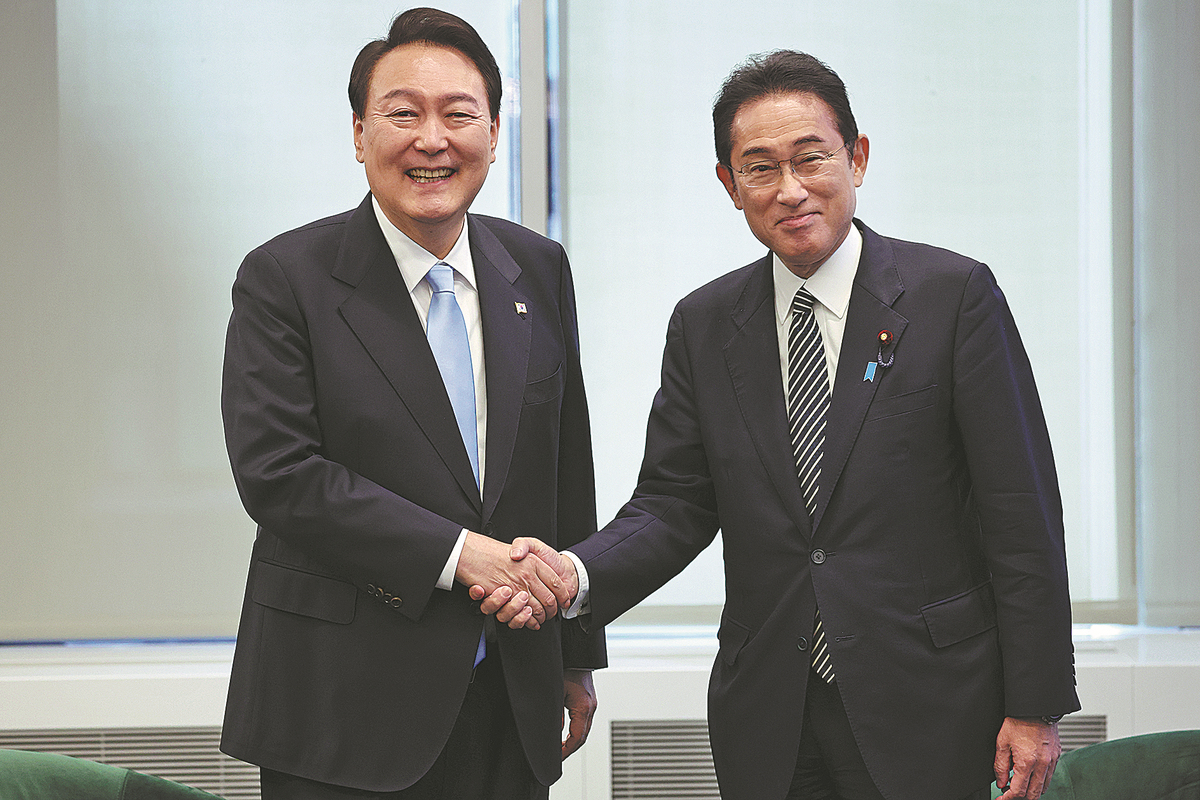Japan, ROK leaders try to break the ice
By ZHAO RUINAN | China Daily Global | Updated: 2022-09-23 07:22

But nations' first top-level talks in years seen as more show than substance
Yoon Suk-yeol, president of the Republic of Korea, and Fumio Kishida, Japan's prime minister, met in New York on Wednesday, marking the first one-on-one talks between leaders of the two countries since December 2019.
During their 30-minute meeting on the sidelines of the 77th United Nations General Assembly, Yoon and Kishida spoke of the need for efforts to improve bilateral relations, which over the past three years have languished at their lowest levels in decades. Ties have suffered as a result of unresolved issues relating to Japan's wartime use of forced labor and territorial disputes.
But the talks, described by Tokyo and Seoul as "informal", amount to "more form than substance" and will not really do much to improve bilateral relations soon, said Zhan Debin, a professor of international relations at Shanghai University of International Business and Economics.
"Yoon's approval ratings domestically have remained relatively low, so he has been trying to reverse them by seeking diplomatic achievements, including warmer relations with Japan," said Zhan, adding that the New York meeting could be seen on some level, at least on the ROK side, as being motivated by Yoon's personal political needs.
Both the ROK and Japanese governments said Yoon and Kishida agreed to continue communications between them. But it wasn't immediately known how meaningful the leaders' conversation was, given the difficulties inherent in addressing the major sticking points in bilateral ties, which deteriorated sharply under governments led by their predecessors.
In 2018, the ROK's top court ruled that two Japanese companies — Nippon Steel and Mitsubishi Heavy Industries — must compensate Koreans who had been forced to work during Japan's 1910-45 colonial occupation. The companies and the Japanese government have dismissed the rulings, arguing that all compensation issues had already been settled under a 1965 treaty that normalized bilateral ties and included Tokyo's provision of millions of dollars to Seoul in economic assistance and loans.
Dispute unsettled
The dispute prompted a downgrading in the trade status of each country by the two governments and threats by Seoul to abandon an intelligence-sharing deal. The former Korean forced laborers and their supporters, for their part, pushed for the forced sales of the Japanese companies' assets in the ROK.
It's unclear if the meeting would yield progress since participants in the court cases maintain that the Japanese companies must first consent to the ROK court rulings if they want to resolve the disputes.
The meeting also occurred after Tokyo denied Seoul's earlier announcement that the two leaders had agreed to meet during the UN assembly, in a sign of the delicate nature of their current relations.
Zhan said the Japanese government was not interested in sitting at the negotiating table unless Seoul makes substantive concessions on the forced labor issue.
However, he said that as the two nations are firm allies of the United States, they have come under pressure from Washington, which wants them to seek better ties.
"The move is a gesture and a signal to the US that they are moving closer. At least they are trying to mend ties. It's a form-over-substance meeting," Zhan said.
The two sides confirmed the importance of promoting cooperation since "Japan and South Korea are important neighbors for each other under the current strategic environment", according to the Japanese Foreign Ministry.
Zhan said the meeting is likely to exert more pressure on Pyongyang, given that Tokyo and Seoul pledged to deal with issues related to the Democratic People's Republic of Korea.
Pyongyang may take countermeasures, said Zhan, indicating the talks have done little to promote regional stability but only add more uncertainty.
Agencies contributed to this story.
























